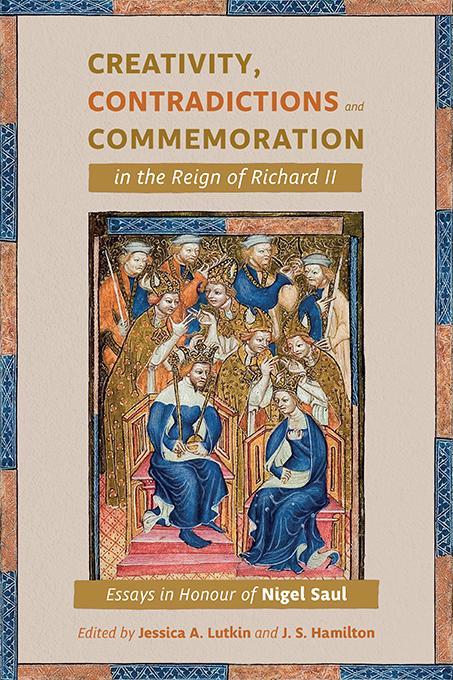 Creativity, Contradictions and Commemoration in the Reign of Richard II
Creativity, Contradictions and Commemoration in the Reign of Richard II Published online by Cambridge University Press: 26 May 2022
During the first two phases of the Hundred Years War, between the 1330s and the 1380s, two men above all personified the chivalric culture with which the nobility of that age identified: Edward, prince of Wales, the victor of the battles of Poitiers (1356) and Nájera (1367), and Bertrand du Guesclin, the spearhead of France's recovery in the 1370s. Their origins could hardly have been more different. The Black Prince had greatness thrust upon him from the moment of his birth in 1330; du Guesclin, some ten years older, was the son of a minor nobleman from north-eastern Brittany and made his name as the captain of one of the many bands of routiers who terrorised the duchy during the Breton civil war of the 1340s and 1350s. This chapter examines the making of these two legends, and in particular the element of rivalry that helped to drive it. Evidence for this rivalry comes from their relationship in life, their posthumous biographies, and their funeral ceremonies.
In considering their personal relationship, it needs to be remembered that their military careers only partly overlapped. The Black Prince's active career spanned the quarter-century from 1346, when he fought at Crécy, to 1371, when he returned to England, too sick to go on ruling his principality of Guyenne. Du Guesclin was also militarily active during the 1340s, but he only came to national prominence following the siege of Rennes in 1357, and what he is chiefly remembered for is what he achieved as constable of France between 1370 and 1380.
The first time the two men are known to have met was in 1365, when du Guesclin was planning to lead the Great Company out of France into Spain. Ostensibly, this was in order to crusade against the Moors in Granada, but his true objectives were rather different: first, to rid France of the troublesome routiers (the poacher now doubling as gamekeeper), and secondly to help Enrique of Trastámara, the bastard half-brother of King Pedro of Castile, to seize the throne and break off the Anglo-Castilian alliance. Thus Pope Urban V, based at Avignon, and King Charles V of France both supported the enterprise.
To save this book to your Kindle, first ensure [email protected] is added to your Approved Personal Document E-mail List under your Personal Document Settings on the Manage Your Content and Devices page of your Amazon account. Then enter the ‘name’ part of your Kindle email address below. Find out more about saving to your Kindle.
Note you can select to save to either the @free.kindle.com or @kindle.com variations. ‘@free.kindle.com’ emails are free but can only be saved to your device when it is connected to wi-fi. ‘@kindle.com’ emails can be delivered even when you are not connected to wi-fi, but note that service fees apply.
Find out more about the Kindle Personal Document Service.
To save content items to your account, please confirm that you agree to abide by our usage policies. If this is the first time you use this feature, you will be asked to authorise Cambridge Core to connect with your account. Find out more about saving content to Dropbox.
To save content items to your account, please confirm that you agree to abide by our usage policies. If this is the first time you use this feature, you will be asked to authorise Cambridge Core to connect with your account. Find out more about saving content to Google Drive.